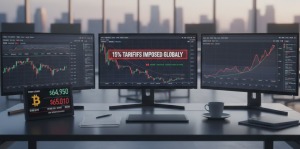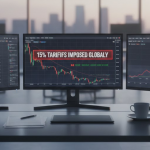Summary
A warning from prominent hedge fund manager Scott Bessent has brought a significant, but previously niche, legal issue to the forefront for investors. The U.S. government faces a potential “fiscal shock” from a liability estimated between $750 billion and $1 trillion. This risk stems from thousands of lawsuits challenging the legality of Section 301 tariffs imposed on Chinese goods during the Trump administration.
If the courts, potentially the Supreme Court, rule that the tariffs were unlawful, the Treasury could be forced to refund years of collected duties to U.S. importers. For investors, this creates a dual-sided scenario: a potential massive cash windfall for thousands of publicly traded companies, but a severe and unexpected strain on U.S. government finances, which could impact the national debt, interest rates, and overall market stability.
The Core News (What Happened?)
Scott Bessent, founder of the hedge fund Key Square Group and a figure floated as a potential future Treasury Secretary, recently highlighted the massive financial risk associated with ongoing legal challenges to the Trump-era Section 301 tariffs. He stated that if the courts ultimately rule against the government, the U.S. Treasury could be on the hook for refunds totaling $750 billion to $1 trillion. This is not new litigation, but Bessent’s high-profile statement has amplified concerns about the sheer scale of the potential liability and its implications for the U.S. economy. The lawsuits, brought by thousands of U.S. importers, argue that the tariffs were imposed illegally, exceeding the authority granted to the executive branch under the Trade Act of 1974.
Context & Expectations
The Section 301 tariffs were a central tool in the Trump administration’s trade war with China, imposed on hundreds of billions of dollars’ worth of goods. Unlike tariffs paid by foreign exporters, these duties are paid by the U.S. companies that import the goods. Immediately following their implementation, thousands of these importers, ranging from major retailers to small manufacturers, filed lawsuits arguing that the administration had failed to follow the required legal procedures.
For years, this issue has been working its way through the U.S. Court of International Trade and is now at the U.S. Court of Appeals for the Federal Circuit. The market’s expectation has largely been that this was a complex, slow-moving legal matter with an uncertain outcome. However, Bessent’s commentary has reframed the narrative. By attaching a near-trillion-dollar figure, he has shifted the focus from a niche trade law dispute to a macroeconomic risk event. The news is not that the lawsuits exist, but that the potential financial consequences are now being discussed as a systemic fiscal threat.
Potential Implications (The Bull vs. Bear Case)

Bull Case: The optimistic view focuses on the thousands of U.S. companies that paid these tariffs. As noted by trade law specialists cited by Reuters, a court ruling in favor of the importers would trigger a colossal cash windfall. Companies across retail, manufacturing, and technology sectors could receive billions of dollars in refunds, plus interest. This influx of cash could be used to pay down debt, initiate stock buybacks, issue special dividends, or fund new capital expenditures, all of which would be highly positive for their respective stock prices. For these specific firms, a successful lawsuit represents a massive, unexpected return of capital.

Bear Case: The pessimistic view, articulated by Scott Bessent, centers on the U.S. government’s fiscal health. A sudden, unfunded liability of this magnitude would be a severe blow. According to analysis in The Wall Street Journal, the Treasury would likely need to dramatically increase its borrowing to cover the refunds. This surge in bond issuance could put upward pressure on interest rates across the economy. Furthermore, it would significantly increase the national debt, potentially spooking credit markets and creating political battles over how to manage the shortfall, whether through spending cuts or tax increases. This “fiscal shock” could undermine investor confidence in U.S. fiscal stability and create broad market volatility.
Disclaimer: This article is for informational purposes only and does not constitute financial, investment, or legal advice. The information provided is a synthesis of publicly available data and expert analysis and should not be considered a recommendation to buy or sell any security. Investing in the stock market involves risk, including the possible loss of principal.4 Past performance is not indicative of future results. Readers should consult with a qualified financial advisor to determine an investment strategy that is suitable for their own personal financial situation and risk tolerance.






















